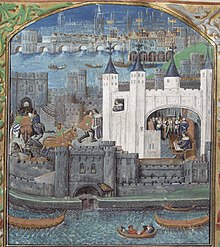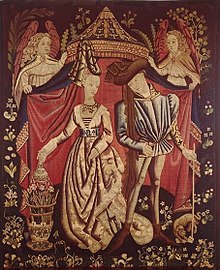Charles, Duke of Orléans
Appearance





Charles of Orléans (24 November 1394 – 5 January 1465) was Duke of Orléans from 1407, following the murder of his father, Louis I, Duke of Orléans. He was also Duke of Valois, Count of Beaumont-sur-Oise and of Blois, Lord of Coucy, and the inheritor of Asti in Italy via his mother Valentina Visconti.
He is now remembered as an accomplished medieval poet, owing to the more than five hundred extant poems he produced, written in both French and English, during his 25 years spent as a prisoner of war and after his return to France.
Quotes
[edit]In French
[edit]- A trompeur, trompeur et demy.
- For a cheat, a cheat and a half.
- Rondel XLVI (Harbottle)
- C'est une dangereuse épargne
D'amasser tresor de regrets.- A dangerous parsimony 'tis
To store up treasure of regrets. - Rondel CLXXV (Harbottle)
- A dangerous parsimony 'tis
- Tout à part moi en mon penser m'encios,
Et fais chasteaulx en Espaigne et en France.- Wrapped in my thoughts, myself forgot,
I castles build in Spain and France. - Rondel CIX (Harbottle)
- Cp. Roman de la Rose, l. 2530 (ed. 1878)
- Wrapped in my thoughts, myself forgot,
- Chose qui plaist est à demy vendue.
- The ware that pleaseth is as good as sold.
- Rondel CLXXXIV (Harbottle)
- Elle a beaux yeulx et ne voit goutte.
- Though Fortune have fine eyes yet sees she nought.
- Lettre en complaincte, V (Harbottle)
- L'habit le moine ne fait pas.
- 'Tis not the robe that makes the monk.
- Rondel CLXXXVI (Harbottle)
- Cp. Clothes maketh the man
- Oncques feu ne fut sans fumée.
- Ne'er fire without smoke was seen.
- Rondel XXXII (Harbottle)
- Cp. No smoke without fire
- Réveiller le chat qui dort.
- To wake the sleeping cat.
- Lettre en Complaincte, V (Harbottle)
- Cp. Let sleeping dogs lie
- Jeu qui trop dure ne vault rien,
Tant va le pot à l'eau qui brise.- Sport that too long endures is nothing worth.
The pot goes once too often to the well. - Rondel XXXVII (Harbottle)
- Sport that too long endures is nothing worth.
- N’est elle de tous biens garnie,
Celle que j'ayme loyaument?- Is she not lavishly endowed,
She whom I love so loyally? - Chanson IV (Taylor)
- Is she not lavishly endowed,
- Soit qu'elle danse, cante ou rie,
Ou face quelque esbatement,
Faictes en loyal jugement,
Sans faveur et sans flatterie.- Whether she dance, or sing, or smile,
Or whate'er else may do or be,
Give me a voice impartial, free
From favour or from flattery. - Chanson IV (Taylor)
- Whether she dance, or sing, or smile,
In English
[edit]- My ghostly fader, I me confesse,
First to God and then to you,
That at a window,—wot ye how?—
I stale a cosse of grete sweteness.
- The smylyng mouth and laughyng eyen gray,
The brestis rounde and long smal armys twayne.
External links
[edit]- T. B. Harbottle; P. H. Dalbiac, Dictionary of Quotations: French and Italian (1904), pp. 3, 20, 30, 31, 45, 83, 173, 200, 213
- Edgar Taylor, Lays of the Minnesingers and Troubadours (1825), pp. 286–93
- E. K. Chambers, Early English Lyrics: Amorous, Divine, Moral and Trivial (1907), p. 31
- "Charles, Duc d'Orléans (1394–1465)", The LiederNet Archive (9 May 2024)

